47% of transitioned veterans have experienced mental health challenges within twelve months of discharge, yet only a quarter receive care*. They represent a high risk for homelessness and suicide.
Made up of a diverse group of people, including those who have served in the armed forces, at FDC we’re grateful to shed light on the support requirements for returning servicemen and women back into their communities. Here, we share the stories of four of our people who have served time in defence.
FDC Site Manager, and former US Army Sergeant, Mat Fisher, shares how his nine years serving in the US Military gave him the skills to thrive in the construction industry.
“Not everyone can say they’ve looked out the open tailgate of a C-130 flying over the Canadian border or done peacekeeping patrols driving Humvees through Bosnia. In my nine years working for the US Army, I had moments where I couldn’t believe that was my life. The training, the experience and getting to do things that normal people don’t get to do was amazing.
I moved to America at 15 as an Australian citizen. Because Australia and America are allies, you can sign up with the American Army—the National Guard—which is similar to our Army Reserve. I always wanted to drive tanks—I thought that sounded awesome, so I signed up when I was 17 years old and when I was 18, I went off to bootcamp in Fort Knox, Kentucky. Because it was part-time, you have to have a career as well, so I worked as a chippy, framing houses, and being a soldier on weekends.
Active duty
It all changed after September 11, because many of the troops were sent overseas to Afghanistan and the National Guard got called up to active duty. That’s how I found myself shipped off to Bosnia, doing Humvee patrols with a mechanised infantry battalion. I was there on a stabilisation mission: peacekeeping patrols, weapons collections, that sort of thing. There was a strong sense of camaraderie and so many incredible experiences. I’ll never forget the time a few of us were selected to do an overflight in a Blackhawk Helicopter to map the earth. That feeling of sitting there flying 150 metres over the treetops was like being on a rollercoaster. It was absolutely amazing.
During my military career, I started out as a Private and worked my way up to Sergeant, but after a certain time serving, you have to denounce your Australian citizenship and become a US citizen. I wasn’t willing to do that, so I moved back home. I looked at what army skillsets I had, and it was all about the heavy vehicles, none of which were in places that really appealed to me. I wanted to be in Canberra where I have family and friends, so I fell back into construction.
There are definitely skills you can take from the army to the construction industry—mainly around leadership, having the ability to assess a situation and understanding what needs to be done. You also operate in a team environment just like in the army, you have that sense of camaraderie as you work towards a common goal.
A rewarding career
I love everything about working in construction. The way you walk away at the end of every day thinking wow—we built that! From delivering a tangible product to the people you meet and the experiences you have along the way, it’s fantastic. FDC is a massive company—approximately 600 people Australia-wide—but they really operate like a family business. The directors here know you by name and remember details about your life—it feels very personal. And the broad-spectrum of projects that we deliver keep it interesting every day. My first project with FDC was a $20 million fitout. Now I’m working on a high-end end-of trip facility, and I recently finished a public swimming pool out in rural New South Wales.
The transition into construction from military, can be a pretty natural progression. In the military, you have that understanding of processes—you start at the bottom and work your way up. It’s the same in construction. It’s a step by step-by-step process and that’s very much the military mind.
I love being site manager, and I also have a heavy interest in health and safety which is a pathway I’d like to explore in future. FDC is very supportive of progression, which is great. Construction is a tough industry, it can be stressful, and we work hard, but we achieve things together. When you work in a team like that, you develop a bond. It’s a rewarding career—and every day is a learning day.
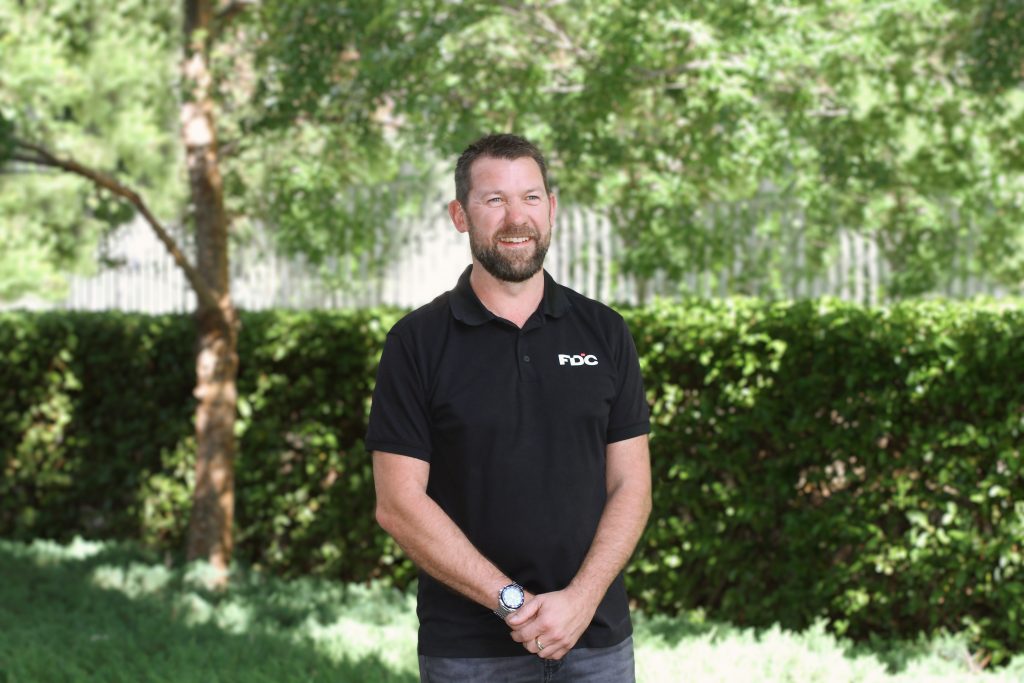
Craftsman (CFN) Neal Smith helped develop the life-saving Bushmaster vehicle with Royal Australian Electrical and Mechanical Engineers. He’s also FDC’s HSEQ Manager in QLD.
The contribution the defence force makes to Australia is significant and complex. It produces great people, and for those who enlist, it delivers experiences you might never have dreamt of. As a kid growing up on the Central Coast it’s amazing to think of the places I’ve been, especially considering I never had any aspirations to join the military.
I was hanging out in Newcastle after I finished high school, when I walked past the recruiting centre. Two weeks later I was in the army. It was a huge culture shock in many ways – from my casual upbringing, with long hair and long days at the beach, to a totally different way of life, but it was unbelievably rewarding.
Army life begins
I started as a Private in an infantry battalion, not just any infantry battalion but D Coy, 6 RAR. You will know this unit from the Battle of Long Tan (in Vietnam), Redgum Song “I was only nineteen and the recent movie “Danger Close”
From there it was a Corps transfer into RAEME (Royal Australian Electrical and Mechanical Engineers) where I did my heavy vehicle diesel mechanic training. As a Craftsman and vehicle mechanic, my main role was keeping all the military vehicles safe and serviceable. The event I was most proud of was developing the Bushmaster vehicle.
We had to test the vehicle, modify and develop it as well as write all the repair manuals like how to take the engine out – and that became the defence document. To see that vehicle go to Iraq and Afghanistan and know it was saving lives was really special. Hundreds of people were dying every day because their vehicles didn’t have the capabilities of the Bushmaster. The development of the Bushmaster meant that our guys were surviving those blasts.
A change of scenery
It was the late ‘90s, early 2000s and Timor, Afghanistan and Iraq were still some time off. We played a role in Iraq, but not like we did later. I was sent to Bougainville, the easternmost island of Papua New Guinea in the Solomon Sea as part of a peace monitoring group, during the civil war there. We were unarmed, and even though I was a mechanic, our job was to get the local heavily armed tribes to hand over their weapons. It’s a bit scary when you think about it, but it was one of the most beautiful places, with the most beautiful people I’ve ever experienced in my life. It became common to walk through the jungle and find WW2 Sherman tanks or be flying in a chopper and see a Japanese Zero fighter aircraft that had crashed into a reef.
In the army, you’re always travelling. I did about 11 moves in nine years, which meant you always got to see something different. From 2000 to 2004, I spent about 40 weeks a year away. I got married in 2000 and was spending less than 10 weeks a year at home, which was one of the reasons I returned to civilian life. I’m passionate about the defence force, have a long family history of military service and I am proud of what I was able to achieve. The contribution it makes to Australia is significant.
We have so many national treasures but just like our WW1 and WW2 vets, their ranks are rapidly thinning and many of them still carry the physical and mental scars to this day. The Vietnam War is of huge importance to me – the way our Vietnam Vets came home, were treated so badly and disrespectfully is something I’ve been deeply affected by. There’s a number of lines in the movie A Few Good Men, where Jack Nicholson’s character says something like, “You can’t handle the truth … you want me on that wall, you need me on that wall” and “You sleep safely at night under a blanket of freedom I provide…and then question the manner in which I provide it”.
Demi Moore’s character is asked “why do you like them so much” (referring to two accused soldiers) and says “because they stand on the wall and say nothing is going to hurt you tonight, not on my watch”.
I know it’s just a Hollywood movie, but there’s truth in that and all military people have a different understanding of the deeper subtext of that movie than non-military people.
Building a new career
When I joined FDC in 2010 I was given the opportunity as a labourer before becoming the HSEQ Manager – that’s Health and Safety Quality, and Environmental. I’d been in the army handling weapons, so there was definitely an element of safety ingrained in me.
My role within FDC is to guide, educate, and mentor our teams to not only make sure that they all go home safely at the end of the day, but to educate and empower them to follow our systems and processes, not because they have to but because they see the value in what we do and want to do it. It’s how we do business. “Tell me and I forget, teach me and I may remember, involve me and I learn” Benjamin Franklin.
I feel very lucky to have joined FDC. There’s been a lot of invaluable mentoring and opportunities to grow and develop. Just like when I was in the army, I’ve always felt like I was part of something here. I’ve been with FDC for over 10 years now and have enjoyed every second of it. It’s very rare for a company that focuses so much on support, development, charity and contribution to the community. We’re a construction company, but more than that, we’re a family. It true what we say, “The more we contribute to your success the more we contribute to our own”.
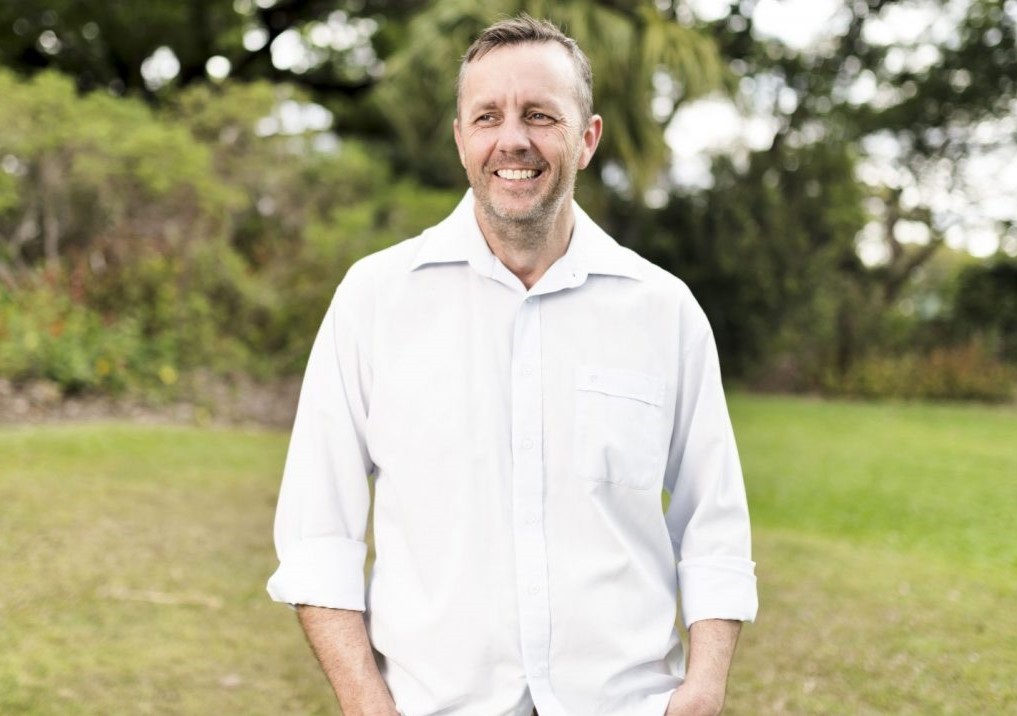
Corporal Matthew Navin, Ret. spent 8 years in the army including deployment in Afghanistan, today he is a Site Manager for FDC in NSW.
I was in the Army for about eight years all up. My career in defence was part-time at first before I enrolled full-time service, and I was lucky in a way, because when I was ready to leave, the transition was fairly easy for me. If you spend a long time in defence, it can become a lot more difficult to join society again as a civilian, so it’s good to know there’s support out there for those who need it.
I was in cadets when I was at school, and enlisted to the Army Reserve at the beginning of Uni. I’m not saying I’m an adrenalin junkie, but I like the feeling that something’s always happening and I enjoy working under pressure.
Climbing the ranks
I started my initial training as a recruit at Kapooka in 2003, posted to, 1st/15th Royal New South Wales Lancers. I was a crewman driver of the M113A1 with the Army APCs (Armoured Personnel Carriers) and later a Cavalry Scout. I transferred to 12th/16th Hunter River Lancers as a Corporal and qualified on the Bushmaster PMV (Protected Mobility Vehicle) staying with the Army Reserves for about five years. At the same time, I was in construction, starting sprinkler fitting as a trade. Later, I transferred over to the B Squadron 3rd /4th Cavalry Regiment squadron, up in Townsville.
In 2008, I was given the opportunity to enroll full-time with my qualifications and training. I was a Corporal by then, and in 2009 I deployed to Afghanistan on Operation Slipper MRTF-2, until February 2010. That was my big stint which rounded out all my years of training and preparedness, after which I left the Army. I was happy with everything I’d achieved and was ready to move on to the next big chapter, to join civilian life again, travel and start a family.
A fulfilling career
I got back into construction in 2013. Stuart King, who also works for FDC, is a good mate of mine – we met in the Army. We joined the same Army Reserve Unit whilst both at Uni but he went down the medical support career path and I stayed with the Armoured Corps, with Armoured vehicles, cavalry scouts and as an NCO training on courses as an instructor. Stuart was already working in construction when I was discharged, and it’s thanks to him that I had an opportunity to join FDC in 2015. He suggested I get back into construction and it was a really good transition for me. It ties in well with military life, from the management structure, the hierarchy of responsibility, to the intensity of the environment.
Working in construction was really helpful for me because it kept me busy working sometimes 12 hour days, up to six days a week. I didn’t have an idle mind to dwell on things or ponder. I was able to process everything and adapt to my new life as I went along. I was learning new process all over again. Being in the army taught me to plan ahead. You have to be able to take instant action and respond straight away if something dynamic changes. On a construction site it’s similar, with all the different trades and complex tasks happening at once interacting with each other.
There are a lot of parallels between being in the military and working in construction in the sense that it can be quite demanding at times. When you’re in the military you do a lot of training and you work your way up through the ranks. In construction, you build from the ground up and there’s a real sense of achievement and completion. The sense of camaraderie and mateship is similar as well. My closest friends and my best mates are all ex-army. There’s a uniqueness in the experiences that we go through together, that creates a bond for life.
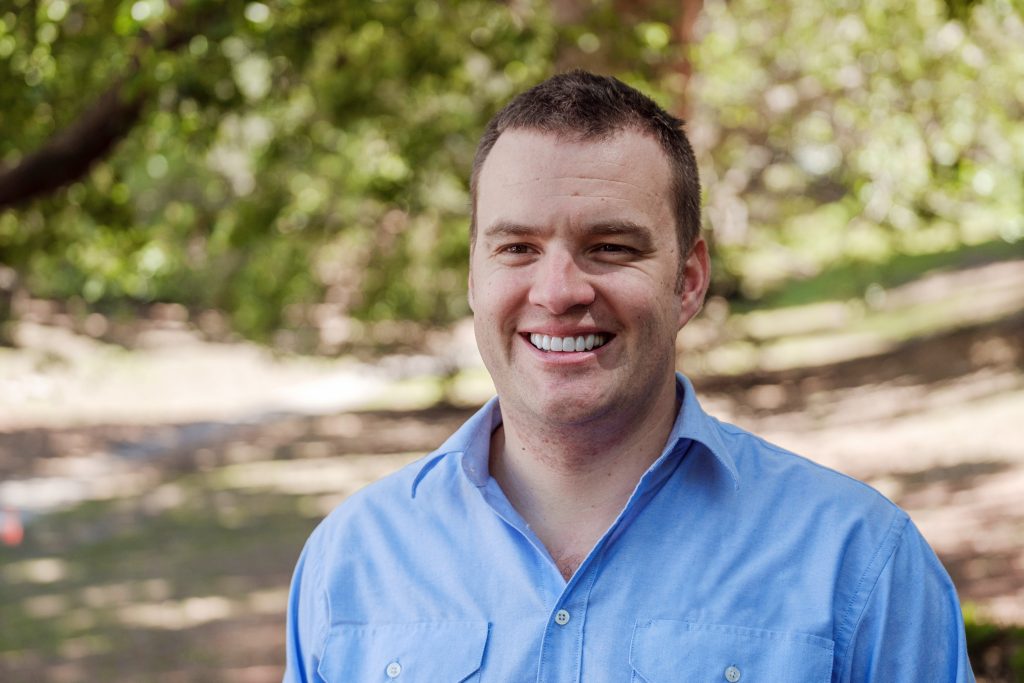
Captain Bruce Vivers served in the army for 14 years which took him everywhere from Pakistan and Afghanistan to joining the SASR. The QLD FDC Construction Manager is about to tackle 300km bike ride in support of veterans health.
I joined the army out of school and gave it the next 14 years of my life. I started at the Defence Force Academy for three years, finishing my officer training at the Royal Military College Duntroon. I graduated from there as a Lieutenant into the Corp of Royal Australian Engineers. After six months of engineering training, I was posted to 18 Field Squadron in Townsville, then went to Pakistan and Afghanistan with the United Nations contingent over there, helping the locals get rid of landmines.
When I returned to the School of Military Engineering in Sydney, I spent a year instructing mine warfare and training new engineer recruits. After a couple more years in Darwin at Northern Command, I joined the SASR (Special Air Service Regiment). In the SASR, I was in a high-performance unit for 5 years, which meant passing their incredibly strenuous selection course. Officers are rotated out of units, to keep them fresh, and give them different experiences, so when it looked like I might be heading for an office-based job in Canberra, I decided to see what else was out there.
A new direction
Being in the army really sets you up with a number of management and leadership skills. They call it imposed discipline – there are no alternatives but to turn up to places on time and do what you’re told, however, this develops your self-discipline. This definitely influenced the way I manage people. My engineering time in the army contributed directly to my management associated with the construction industry. I’ve been at FDC for about seven years now and it’s such a positive culture.
My transition to civilian life was more about missing the camaraderie than anything else. In the Military you go through a lot of arduous things with people, and that brings you together. You look after each other and look out for each other’s wellbeing. I was probably luckier than most, in that I was posted to East Timor for three months and I was in Pakistan with the demining in the early nineties. Sure, I was exposed to some reasonably stressful circumstances, but at the end of the day, I didn’t take anyone’s life. As I was not faced with those moral dilemmas, it limited my exposure to PTSD.
Cycling for a cause
Supporting veterans is a difficult thing in my mind because everyone has such different needs. Amongst my friends, there’s the whole spectrum of exposure to PTSD – mates that do need help, mates that don’t, mates that need help but don’t know it or are unwilling to accept it. Given that the issues are so complex, and there’s a whole gamut of aspects to cover, people do fall through the cracks. That’s where grass roots veteran support charities really make a difference.
In October I’m cycling 300 kilometres in two days to raise money for 4 Aussie Heroes during their annual Pedals ‘n Medals bike ride. I’ve only been cycling for about 6 weeks. James Hamer, (also from FDC) is a mad cyclist and was talking about the ride. He said, “You should do it – go on, you were in the military!” It’s a pretty daunting task, but he got at me once too often and I said, “Right – I’m in!”
On the ride, we’ll do 150km a day for the two days, and vertically, we’re going to be climbing 4,000 metres. I’ve been punishing myself on the bike for the last six weeks in training. But when it comes to the race, my strategy’s pretty simple: don’t give up – just keep turning those pedals.
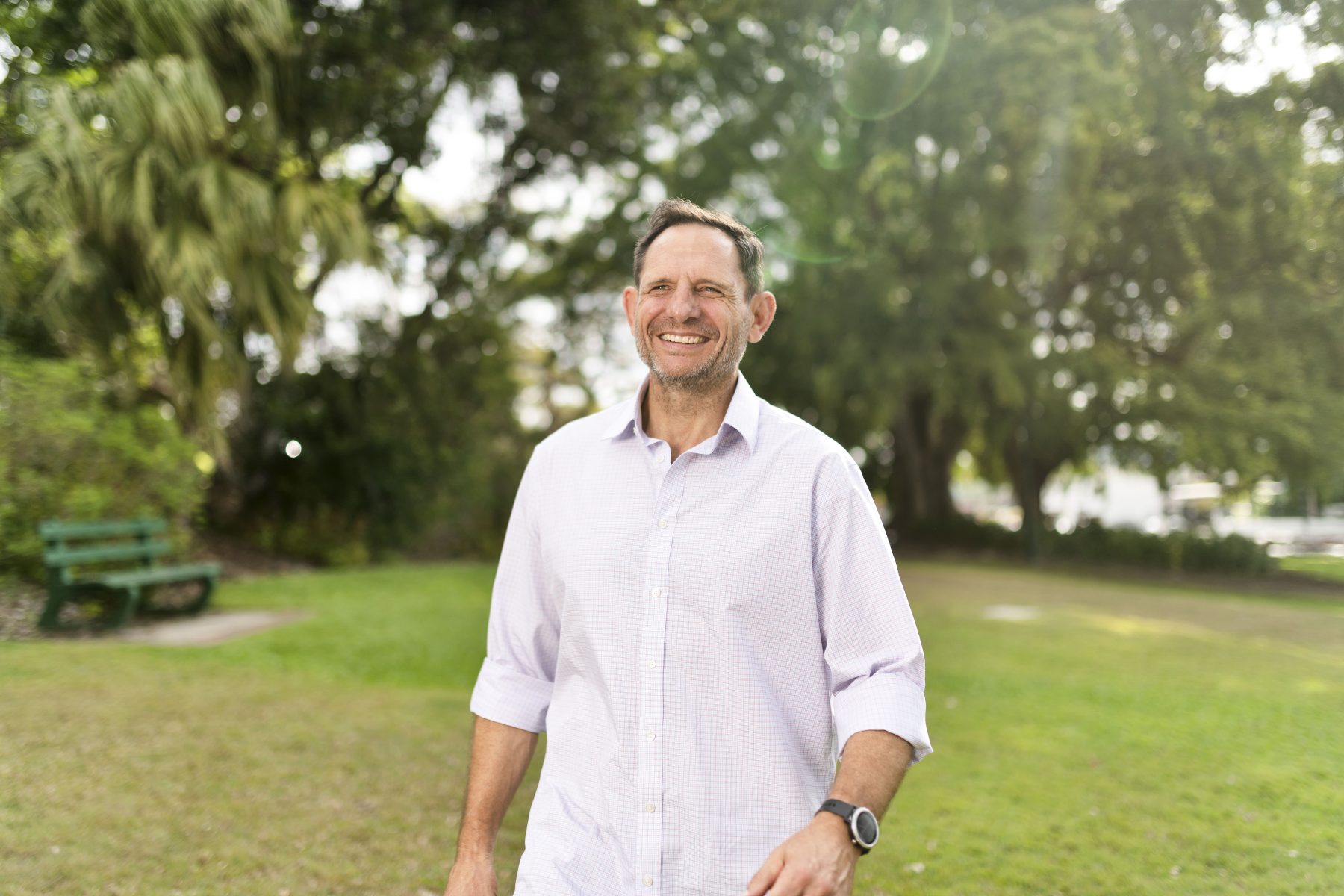
Our giving program proudly supports charities dedicated to improving the lives of our returned service people. Through our partnerships, we provide essential rehabilitation, crisis support, and holistic care for those who have served our communities.
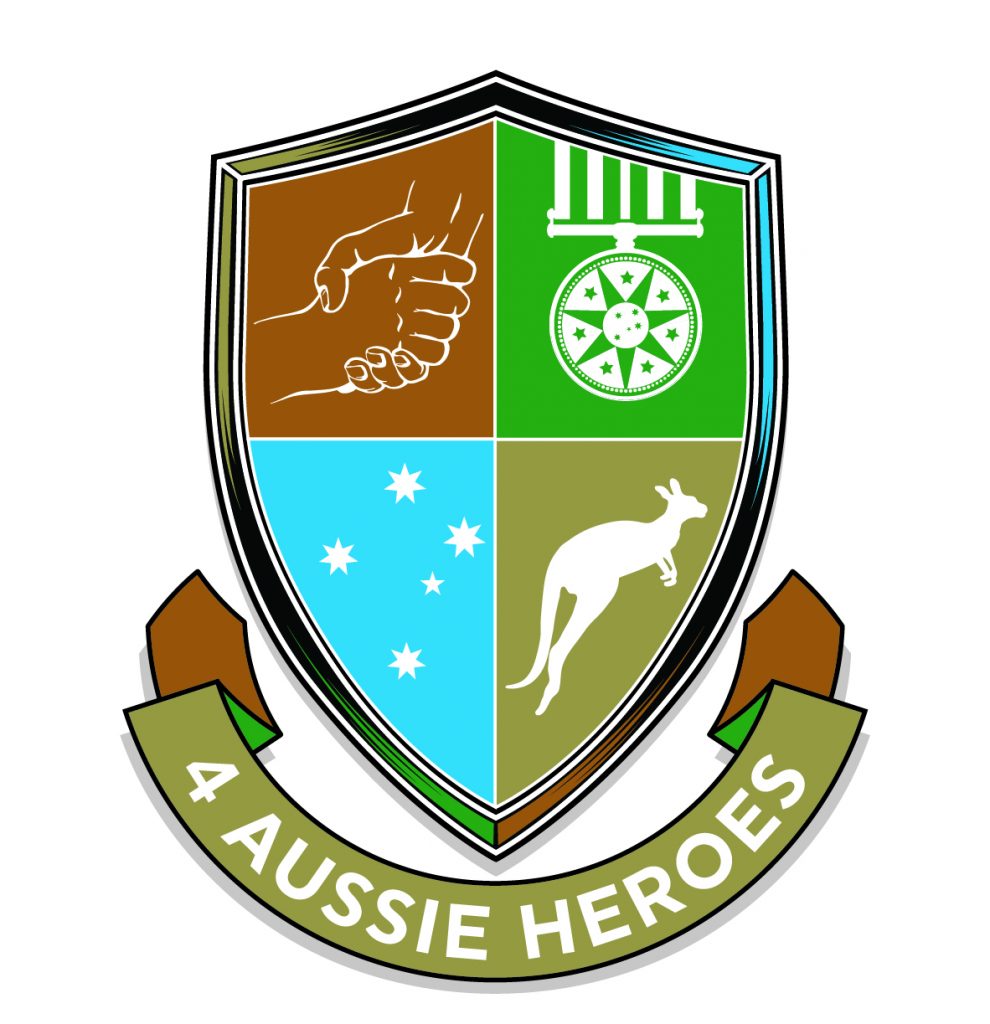

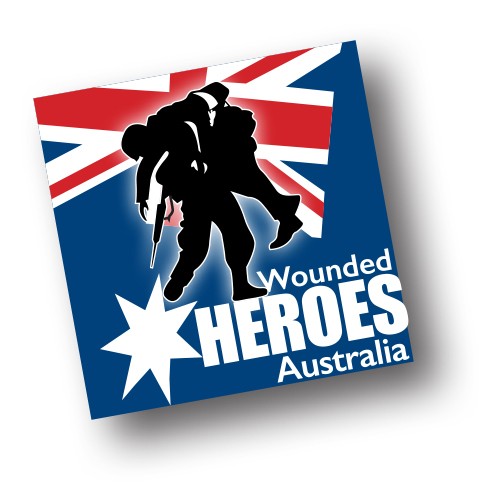
4 Aussie Heroes addresses the critical gap in the rehabilitation process for current and former military and first responder personnel experiencing PTSD and other mental health challenges. Their holistic approach extends to partners, children, and carers to ensure enduring recovery and wellbeing.
Established in 2012, Soldier On is a national not-for-profit organisation dedicated to supporting the veteran community. Through the delivery of holistic services, they assist over 10,000 veterans and their families, addressing the physical and psychological impacts of service to help them build better futures.
Wounded Heroes Australia is a national charity providing frontline crisis support to Australian servicemen and women in need. Their services include emergency food assistance and accommodation for at-risk current and former service personnel and their families, ensuring critical aid is available when it is needed most.
*Wounded Heroes Annual Report 2019.

22-24 Junction Street,
Forest Lodge NSW 2037
(02) 8117 5000
Australian Offices
| Sydney | (02) 8117 5000 |
| Adelaide | (08) 8425 8600 |
| Brisbane | (07) 3230 8700 |
| Canberra | (02) 6222 8800 |
| Melbourne | (03) 9254 0000 |
| Perth | (08) 6165 5800 |
